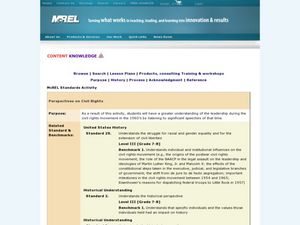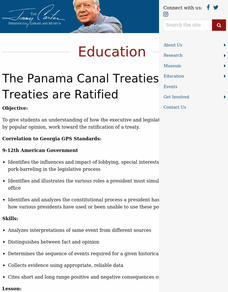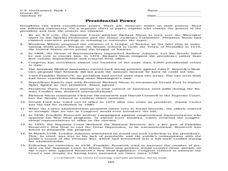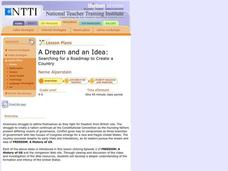DocsTeach
Documenting Key Presidential Decisions
It's match time! Academics participate in an exciting matching game using primary sources. The activity uses documents of key decisions and matches them to the presidents that they are attributed to. Scholars also make a list of key...
US House of Representatives
House History Comes Alive
How reliable is oral history? The resource uses the oral history website to help academics understand the pros and cons of using recollections to teach others. Scholars complete a worksheet, draft a letter to a representative, and...
Judicial Learning Center
Do You Know Your Bill of Rights?
The Bill of Rights is much more than an important piece of paper! The rights cover everything from freedom of speech to the right to remain silent if arrested. Scholars find out their own rights by answering the questions in the form of...
Curated OER
The Constitution
Eighth graders watch as their teacher presents information on the Constitution, government and laws through a PowerPoint presentation. In groups, they discuss the importance of government and laws and identify the main ideas in the...
Curated OER
Create Your Own Constitution
Eighth graders explore the processes, purpose and components of a good and just constitution. They focus on the Constitution of the United States of America. Students discuss the purpose of a constitution and reasons why the Constitution...
Curated OER
Interest Groups in South Carolina Government
Students create an outline and short class presentation about an assigned interest group by conducting research using the Internet and interest group contacts. They evaluate the role of an assigned interest group in the South Carolina...
Curated OER
War Making: Executive and Legislative Powers
Students examine executive and legislative powers. In this federal powers lesson, students determine who has the power to wage war in the U.S. government. Students analyze the Constitution and research historical precedents regarding...
Curated OER
Telegram from Senator Joseph McCarthy to President Harry S. Truman
Students research the McCarthy hearings to determine the following: time frame of hearings, how they were broadcast, how the press reacted, and how the American people reacted in light of the Korean Conflict and the Cold War.
Curated OER
Stepping Inside the Flowchart: How Does a Bill Become a Law?
Students explore the steps a bill must pass through to become a law and create a flow chart that maps the complexities of the process. They research the committees that are involved in a bill that relates to energy policy and the...
Curated OER
Moot Court
Students research and discuss court cases in preparation for Moot Court. Student attorneys research precedents involving their cases, while student justices research political ideology of Supreme Court Justices. Student attorneys then...
Curated OER
Perspectives on Civil Rights
Students examine speeches of the Civil Rights Era. For this American history lesson, students listen to speeches delivered by Martin Luther King, Jr. and John F. Kennedy. Students respond to guiding questions as they listen to the...
Curated OER
Fourth Grade Social Studies
In this social studies worksheet, 4th graders answer multiple choice questions about George Washington, early America, natural resources, and more. Students complete 8 questions.
Curated OER
Hate-Crimes and Punishment
Students research and write about the effectiveness of hate-crime legislation in the United States
Curated OER
Supreme Court Shake-Up
Students examine the role of the Supreme Court through an interactive program. They analyze the history of the Court and its members. They finally explore how the Supreme Court works.
Curated OER
The "Big Four"
Students identify the four individuals who are identified as the "Big Four", examine the years they were on the bench together, and look and the impact they made in key cases.
Curated OER
The Illustrated Bill of Rights
Students shoot Bill of Rights videos. In this Bill of Rights lesson plan, students film digital segment that illustrate the meaning of the first 10 amendments. Students integrate the video clips into PowerPoint presentations.
Curated OER
It's All About Justice
Students examine a specific environmental concern to their local community. In groups, they explore how the justice system would deal with the problem by participating in a treasure hunt. They review the meaning of federal and state...
Curated OER
The Panama Canal Treaties: How Treaties Are Ratified
High schoolers gain an understanding of how the executive and legislative branches, influenced by popular opinion, work toward the ratification of a treaty. They examine the influences and impact of lobbying and special interests in the...
Curated OER
Checks on Presidential Power
Students examine presidential powers. In this checks and balances lesson, students identify the constitutional and informal restraints of the president and consider the reasons for the limitations.
Curated OER
We the People: 270 out of 538
Students engage in a lesson that helps them better explain the quadrennial ritual surrounding the election of a president in the United States of America.
Curated OER
History in the Making
Students create and perform a skit that demonstrates the historical period and foriegn policy of a particular president. They first complete a diagram of George Washington's presidency as a class and then form small groups to research...
Curated OER
The Right to Remain Resilient
Students examine the Civil Rights Movements in the U.S., both current and historic. In small groups students investigate a specific civil rights group, create an illustrated timeline, noting key events, people, and state and federal laws.
Curated OER
Elections for Elementary Students
Students explore various websites that explain how primaries, caucuses, and general elections function. They view sample ballots, and analyze the executive branch, U.S. presidents, and citizenship.
Curated OER
A Dream and an Idea: Searching for a Roadmap to Create a Country
Students compare and contrast opposing visions of government held by the founding fathers. They evaluate the roles of historical leaders in shaping the U.S. as an emerging nation.







